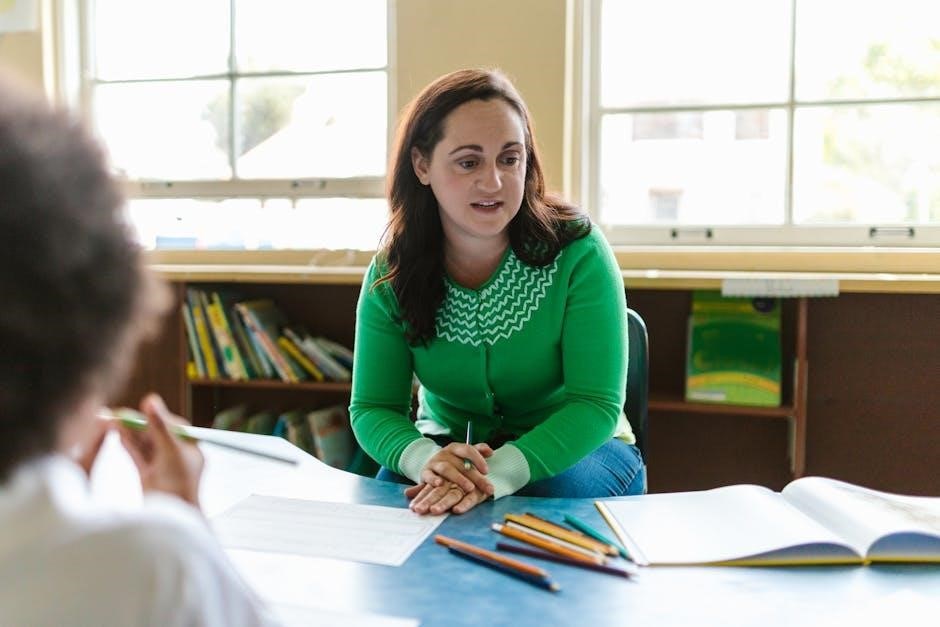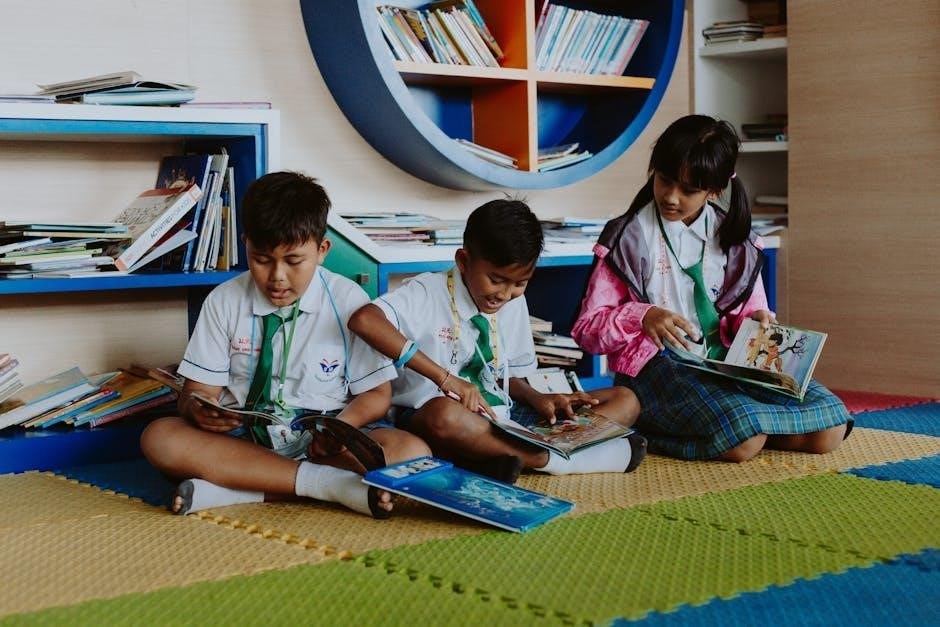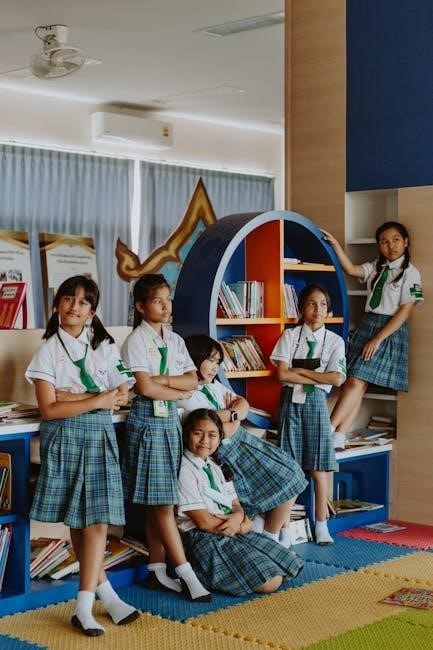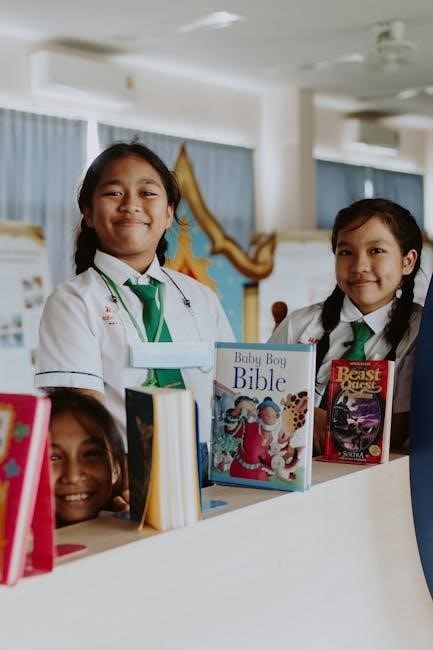Singapore’s primary education system is renowned for its rigorous curriculum and holistic development approach, fostering academic excellence and creativity. It lays a strong foundation for future learning, emphasizing critical thinking and problem-solving skills. The system integrates various subjects, including English, Mathematics, Science, and Social Studies, to provide a well-rounded education. With a focus on innovation and technology, Singapore’s primary schools utilize digital resources like PDF books to enhance learning experiences, ensuring accessibility and engagement for all students.
1.1 Overview of Primary Education in Singapore
Singapore’s primary education system is highly structured and rigorous, focusing on holistic development. It emphasizes academic excellence, creativity, and critical thinking, preparing students for future challenges. The curriculum is divided into key subjects like English, Mathematics, Science, and Social Studies, ensuring a balanced education. Technology integration plays a significant role, with digital tools enhancing learning experiences. Primary education in Singapore is compulsory and lasts six years, culminating in the Primary School Leaving Examination (PSLE). The system is renowned globally for its effectiveness, producing students with strong foundational skills and a lifelong love for learning.
1.2 Importance of Primary School Books in Singapore
Primary school books in Singapore are essential for delivering the curriculum’s objectives, providing structured content aligned with educational goals. They serve as primary resources for students, offering comprehensive coverage of subjects like English, Mathematics, and Science. These books are designed to foster critical thinking, creativity, and problem-solving skills, which are integral to Singapore’s education system. Access to these materials ensures consistency in learning, enabling students to build a strong academic foundation. Additionally, the availability of PDF versions enhances accessibility, allowing students to study anytime and anywhere, thus supporting their overall educational journey and preparation for national examinations like the PSLE.
1.3 Structure of the Primary School Curriculum
The primary school curriculum in Singapore is structured to provide a holistic education, focusing on core subjects like English, Mathematics, Science, and Social Studies. These subjects are complemented by non-academic areas such as Physical Education, Art, and Music. The curriculum is designed to develop critical thinking, creativity, and problem-solving skills, preparing students for future challenges. It progresses from foundational knowledge in lower primary to more advanced concepts in upper primary, culminating in the Primary School Leaving Examination (PSLE) at the end of Primary 6. This structured approach ensures a balanced and comprehensive education, equipping students with essential skills for lifelong learning.

Popular Primary School Books in Singapore
Popular primary school books in Singapore include core subjects like English, Mathematics, and Science, designed to foster comprehensive learning and academic success, available in PDF formats.
2.1 English Language Books for Primary Schools
English language books for primary schools in Singapore are carefully curated to develop strong communication skills. These books focus on grammar, vocabulary, and comprehension, aligning with the MOE curriculum. Popular titles include Oxford English and Marshall Cavendish, which offer engaging activities and stories. Many of these books are available in PDF format, making them accessible for students to download and study at home. They emphasize creative writing and critical thinking, preparing students for higher-level English proficiency. The structured approach ensures a solid foundation, fostering a love for reading and learning in young minds across Singapore.

2.2 Mathematics Textbooks for Primary Levels
Mathematics textbooks for primary levels in Singapore are designed to build a strong numerical foundation; These books, such as Singapore Math and My Pals Are Here, focus on problem-solving and critical thinking. They incorporate visual aids and real-world examples to make learning engaging. Many are available in PDF format, allowing easy access for students. The textbooks follow the MOE curriculum, ensuring comprehensive coverage of topics like arithmetic, geometry, and algebra. Interactive exercises and assessments help track progress, fostering confidence and fluency in math. These resources are widely regarded for their effectiveness in nurturing young mathematicians in Singapore.

2.3 Science and Technology Books for Young Learners
Science and technology books for primary levels in Singapore are crafted to spark curiosity and foster exploration. Titles like Science Alive and Young Scientist use interactive content and hands-on activities to engage students. These books, often available in PDF format, cover topics such as biology, physics, and environmental science. They align with the MOE curriculum, emphasizing inquiry-based learning and critical thinking. Visual aids, experiments, and real-world applications make complex concepts accessible. Digital versions enhance learning through multimedia features, preparing young learners for a tech-driven future while nurturing their interest in STEM fields from an early age.

2.4 Social Studies and Civics Textbooks
Social Studies and Civics textbooks in Singapore focus on fostering national identity and global awareness. Titles like Our World and Civic and Moral Education explore Singapore’s history, culture, and values. These books, available in PDF formats, emphasize active citizenship and community involvement. They cover themes such as heritage, diversity, and sustainability, preparing students to contribute positively to society. Digital versions include interactive elements like maps and timelines, enhancing engagement. By aligning with the MOE curriculum, these textbooks ensure students develop a strong sense of responsibility and respect for cultural diversity, equipping them with essential life skills and values.
2.5 Other Subjects and Their Respective Books
Beyond core subjects, Singapore’s primary schools offer books for Art, Music, Physical Education, and Health Education. These texts, like Exploring Art and Healthy Living, focus on creativity, physical well-being, and life skills. Art books provide techniques and cultural insights, while Music textbooks introduce theory and appreciation. Physical Education materials emphasize fitness and teamwork, aligning with holistic development goals. Health Education books cover nutrition, safety, and mental health, fostering responsible lifestyles. Available in PDF formats, these resources enrich students’ learning experiences, promoting creativity, health, and social skills. They complement the curriculum, ensuring a balanced education that prepares students for life beyond academics.

Where to Find Singapore Primary School Books in PDF Format
Singapore primary school books in PDF format are available through official sources, educational websites, and school platforms, offering convenient access to essential learning materials for students.
3.1 Official Sources for Downloading Primary School Books
The Ministry of Education (MOE) and Singapore’s National Library Board provide official platforms for downloading primary school books in PDF format. These sources ensure authenticity and quality, offering a wide range of curriculum-aligned materials. Parents and students can access these resources through designated portals, which are regularly updated to reflect the latest educational content. Official sources are reliable and adhere to copyright laws, making them the preferred choice for obtaining digital learning materials. They also support the integration of technology in education, aligning with Singapore’s vision of fostering a digitally literate society.
3.2 Educational Websites Offering Free PDF Downloads
Several educational websites in Singapore provide free PDF downloads of primary school books, supporting accessible learning. Platforms like OpenStax and Khan Academy offer high-quality resources aligned with the curriculum. These websites cater to diverse learning needs, ensuring students can access materials anytime. They often feature interactive content, enhancing engagement and understanding. Parents and educators appreciate the convenience these sites offer, reducing the need for physical textbooks. By leveraging technology, these platforms contribute to a more inclusive and efficient education system, aligning with Singapore’s commitment to innovation in learning. They play a vital role in supplementing traditional education with modern, accessible resources.
3.3 Role of the Ministry of Education in Providing Resources
The Ministry of Education (MOE) in Singapore plays a pivotal role in providing educational resources, including primary school books in PDF format. The MOE ensures that these resources are aligned with the national curriculum and are accessible to all students. Through its official website and partnerships with schools, the MOE distributes digital materials, promoting equitable learning opportunities. These resources are carefully curated to meet educational standards, supporting both teachers and students. The MOE also collaborates with the National Library Board to enhance access to digital content, fostering a culture of lifelong learning and academic excellence across the nation.
3.4 National Library Board and Its Digital Resources
The National Library Board (NLB) of Singapore plays a significant role in providing digital resources, including primary school books in PDF format, to support education. The NLB offers a wide range of e-books, educational materials, and digital tools through its online platforms, ensuring accessibility for students and educators. These resources are carefully curated to align with the national curriculum, promoting learning and academic excellence. The NLB also collaborates with schools and the Ministry of Education to enhance the availability of digital content, making it easier for students to access quality educational materials. This initiative fosters a culture of digital literacy and lifelong learning.

3.5 School Websites and Their Educational Materials
School websites in Singapore serve as valuable platforms for accessing educational materials, including primary school books in PDF format. Many schools provide downloadable resources such as syllabi, lesson plans, and study guides to support student learning. These materials are often organized by subject and grade level, ensuring easy access for students and parents. Additionally, school websites may offer links to external educational platforms or repositories where PDF books can be found. This initiative promotes convenience and flexibility, allowing students to access learning materials anytime, anywhere. It also reflects the schools’ commitment to fostering a culture of continuous learning and academic success.
Benefits of Using Digital Books for Primary Education
Digital books enhance accessibility, reduce costs, and promote environmental sustainability. They offer interactive content, improving engagement and understanding for primary students, while providing convenient access to learning materials anytime.

4.1 Accessibility and Convenience of PDF Formats
PDF formats offer unparalleled accessibility and convenience for primary school students in Singapore. These files can be easily accessed on various devices, including tablets, smartphones, and laptops, without requiring specialized software. This versatility ensures that students can review their materials anytime, whether at home, in school, or during commutes. The convenience of PDFs also lies in their ability to be downloaded once and used multiple times, reducing the need for physical books and saving storage space. Additionally, PDFs enable quick searches and easy navigation, making studying more efficient and fostering a seamless learning experience for young learners.
4.2 Cost-Effectiveness of Free Downloads
Free PDF downloads of primary school books in Singapore significantly reduce educational expenses for families. By eliminating the need to purchase physical textbooks, parents save money on annual book purchases. This cost-effectiveness is particularly beneficial for low-income households, ensuring equal access to quality educational resources. Schools and the Ministry of Education often provide these materials at no cost, further supporting affordability. The availability of free PDFs also reduces the financial burden on institutions, allowing them to allocate resources to other critical areas. This approach promotes inclusivity and supports the government’s commitment to providing affordable, high-quality education for all students.
4.3 Environmental Impact of Digital Learning Materials
The shift to digital learning materials significantly reduces the environmental impact of traditional paper-based education. By minimizing the need for physical textbooks, PDF downloads conserve trees and reduce deforestation. Additionally, digital books eliminate the carbon footprint associated with printing, transportation, and distribution of physical materials. This eco-friendly approach aligns with Singapore’s sustainability goals, promoting a greener education system. The reduction in paper waste also contributes to global efforts to combat climate change, making digital learning resources a responsible choice for both students and the planet. This sustainable practice supports long-term environmental conservation while maintaining high-quality educational standards.
4.4 Enhanced Learning Experience Through Interactive Content
Digital books offer an enhanced learning experience through interactive content, engaging students with multimedia elements like videos, animations, and quizzes. These features make complex concepts more accessible and fun, fostering deeper understanding and retention. Interactive content also allows for personalized learning, catering to different learning styles and paces. Students can revisit challenging topics and explore additional resources, promoting self-directed learning. Furthermore, interactive elements encourage active participation, making lessons more dynamic and immersive. This approach not only improves academic performance but also develops critical thinking and digital literacy skills, preparing students for a technology-driven future. Interactive content thus enriches the educational journey.
Challenges in Accessing Free Primary School Books
Accessing free primary school books in Singapore faces challenges like copyright restrictions, limited subject availability, and reliance on internet connectivity, affecting equitable education access for all students.
5.1 Copyright Issues and Legal Restrictions
Copyright laws in Singapore strictly protect educational materials, limiting the availability of free primary school books in PDF format. Publishers often enforce these rights, making it illegal to share or download copyrighted content without permission. This restricts access to free resources, particularly for low-income families. Legal penalties for copyright infringement discourage unauthorized distribution, further reducing the availability of free books. As a result, students and educators must rely on purchased materials or official sources, creating a barrier to equitable education access. These legal restrictions highlight the need for authorized platforms to provide affordable or free resources while respecting intellectual property rights.
5.2 Limited Availability of Certain Subjects
The availability of free PDF books for certain primary school subjects in Singapore is limited, particularly for niche or specialized topics. While core subjects like English and Mathematics have ample resources, subjects like Art, Music, and Physical Education often lack accessible digital materials. This disparity creates challenges for students and teachers seeking comprehensive learning resources. Additionally, some subjects may have outdated or insufficient content available online, further complicating access. This limited availability underscores the need for a more diverse range of digital resources to support all areas of the curriculum effectively and ensure a balanced educational experience for all students.

5.3 Dependence on Internet Connectivity
Accessing free primary school books in PDF format often requires reliable internet connectivity, which can be a challenge for some students in Singapore. While the country boasts advanced digital infrastructure, not all households have equal access to high-speed internet. This digital divide can hinder students’ ability to download and utilize these resources, creating disparities in education. Additionally, schools in rural or less developed areas may face connectivity issues, further complicating access to digital learning materials. This dependence on internet connectivity underscores the need for alternative solutions to ensure all students can benefit from educational resources, regardless of their location or socioeconomic background.
5.4 Quality and Accuracy of Downloadable Content
The quality and accuracy of downloadable primary school books in Singapore are crucial for effective learning. While official sources ensure high standards, third-party websites may offer outdated or incorrect content. Students and parents must verify the credibility of sources to avoid misinformation. Additionally, some PDFs may lack proper formatting or essential updates, which can confuse learners. It is vital to cross-check downloaded materials with official syllabi or consult teachers to ensure accuracy. The Ministry of Education and schools often provide guidelines to help identify reliable resources, safeguarding the educational experience and maintaining the rigorous standards Singapore’s education system is known for.

Tips for Downloading and Using Primary School Books
- Verify the authenticity of sources to ensure accuracy.
- Check for the latest editions of the books.
- Organize PDFs in folders for easy access.
- Ensure compatibility with your reading devices.
- Use bookmarks and annotations for effective studying.
6.1 Verifying the Authenticity of Sources
Verifying the authenticity of sources is crucial when downloading primary school books in PDF format. Ensure the website is official or affiliated with recognized educational institutions. Look for ISBN numbers and publication dates to confirm legitimacy. Cross-check with the Ministry of Education or National Library Board for accuracy. Avoid unofficial platforms that may provide outdated or incorrect content. Use checksums or digital signatures if available to verify file integrity. Authentic sources guarantee that the material aligns with Singapore’s curriculum standards, providing students with reliable and relevant learning resources. This step ensures quality education and avoids potential legal or academic issues.
6.2 Ensuring Compatibility with Devices
Ensuring compatibility with devices is essential for seamless access to Singapore primary school books in PDF format. Check if the PDF files are compatible with your device’s operating system, such as iOS, Android, or Windows. Use updated PDF readers like Adobe Acrobat or Foxit Reader for optimal viewing. Verify that your device has sufficient storage and meets the minimum requirements for opening large files. Additionally, ensure a stable internet connection for downloading PDFs, especially for interactive content. Compatibility ensures that students can access and utilize digital resources effectively across various devices, promoting a smooth and uninterrupted learning experience.
6.3 Organizing Digital Books for Easy Access
Organizing digital books is crucial for efficient access and management. Create folders on your device labeled by subject or grade level to store PDFs systematically. Use clear file names, such as “Math Grade 3 Chapter 1,” for easy identification. Consider adding tags or metadata to enhance searchability. Regularly update and delete outdated files to avoid clutter. Use cloud storage services like Google Drive or Dropbox for centralized access across devices. Implement a backup system to prevent data loss; Teach students and parents how to navigate and maintain this system, ensuring everyone can locate and utilize the resources effectively.
6.4 Encouraging Responsible Use of Digital Resources
Encouraging responsible use of digital resources is essential for fostering a culture of integrity and respect for intellectual property. Establish clear guidelines for students and parents on proper usage, emphasizing the importance of not sharing copyrighted materials without permission. Teach students to use digital books for educational purposes only and to avoid unauthorized distribution. Promote the use of strong passwords and regular updates to ensure device security; Encourage a balance between technology use and other activities to prevent over-reliance. By instilling these values, students will develop a responsible approach to digital resources, supporting their academic growth while respecting legal and ethical standards.
The Role of Technology in Singapore’s Education System
Technology plays a pivotal role in Singapore’s education system by integrating digital tools and resources, enhancing accessibility to materials like PDF books, and fostering personalized, engaging learning experiences for students.
7.1 Integration of Digital Tools in Classrooms
The integration of digital tools in Singapore’s primary school classrooms has revolutionized teaching and learning. Interactive whiteboards, educational software, and online platforms are widely used to enhance engagement and cater to diverse learning styles. Digital tools like PDF books and multimedia resources are seamlessly incorporated into lessons, making learning more interactive and accessible. Teachers leverage these tools to deliver content creatively, while students benefit from personalized learning experiences. This approach not only aligns with the curriculum but also prepares students for a technology-driven future, fostering innovation and critical thinking skills from an early age.
7.2 Impact of Technology on Learning Outcomes
Technology has significantly enhanced learning outcomes in Singapore’s primary schools by providing access to a wealth of educational resources, including PDF books. These digital materials offer interactive and engaging content, which has been shown to improve student understanding and retention. The ability to access these resources anytime and anywhere allows for personalized learning, catering to different paces and learning styles. Additionally, technology facilitates real-time feedback and assessment, enabling teachers to identify areas where students may need extra support. Overall, the integration of technology has led to improved academic performance and better preparedness for the demands of a rapidly changing world.
7.3 Future Trends in Educational Resource Distribution
The future of educational resource distribution in Singapore is expected to be highly digitalized, with a focus on interactive and personalized learning materials. The use of AI-driven platforms to tailor resources to individual student needs is anticipated to rise. Cloud-based solutions will likely become more prevalent, allowing seamless access to PDF books and other materials across devices. Additionally, the integration of multimedia elements, such as videos and simulations, into digital textbooks will enhance engagement. The government and publishers are expected to collaborate more closely to ensure high-quality, curriculum-aligned content. These trends aim to create a more dynamic and accessible learning environment for students.
In conclusion, Singapore’s primary school books in PDF format offer accessible, cost-effective learning resources, supported by technology, ensuring quality education for all students.
8.1 Summary of Key Points
Singapore’s primary education system is highly structured, emphasizing a balanced curriculum that includes English, Mathematics, Science, and Social Studies. The use of PDF books offers convenience and accessibility, aligning with the nation’s focus on technology integration. These resources are widely available through official sources, educational websites, and libraries, ensuring affordability and environmental sustainability. However, challenges like copyright issues and internet dependency exist. Despite these, the benefits of digital learning materials, such as enhanced engagement and cost-effectiveness, make them invaluable for students. The system’s commitment to innovation and quality education underscores its global reputation for excellence.
8.2 Final Thoughts on Accessing Primary School Books
Accessing Singapore primary school books in PDF format is straightforward, with numerous official and educational platforms offering free downloads. The integration of technology in education has made learning materials more accessible and convenient. While challenges like copyright and internet dependency persist, the benefits of digital books, such as cost-effectiveness and environmental sustainability, outweigh these concerns. Parents and students are encouraged to explore verified sources and utilize these resources responsibly. The shift toward digital learning underscores Singapore’s commitment to innovation and quality education, ensuring students are well-prepared for future challenges.